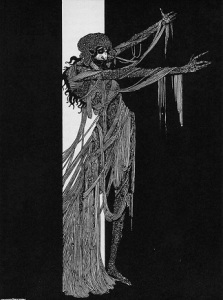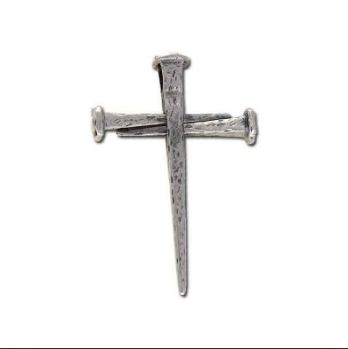At times, we look to our mates and think “Go. Save yourself. I can give you nothing, anymore.”
Whatever we promised in our first days, or on the marriage altar—all the vigor and health and humor and selflessness we once offered—is lost. Not that we surrendered it, apathetically. We were robbed of it. What we offer now is, perhaps, a slim chance of a future, and a ceaseless threat.
That is how I think on my worst days. They come like speedbumps on a dark road; without warning, a sudden slam, a jarring of the bones and certainty of damage. Yet after a few tentative yards at a slower speed, I find all is well.
On my best days—nine out of ten of them—I promise Sadie Mae, with absolute certainty, “Don’t you worry; I’ll be here for our 10th wedding anniversary (this October), and Christmas, and both our 60th birthdays.”

Sadie Mae was no speedbump; more like turning the corner on a dull road to find a gorgeous vista ahead and saying “I never knew this was here!” She lived nowhere near the city where I was, cared nothing for “meat-and-greets” that young Bostonians attended (yes, I meant “meat,” not “meet”), appreciated antiques, taught school, and volunteered at a halfway house for refugees of Somalia, Iraq, and places like them. At 110 pounds, she had gladiator-sized self-possession. As my father said of her, after I brought her to my parents’ house for the first time, “Some people you meet, but you don’t really care if you see them again. Others you meet, and hope they come back.” Such is Sadie Mae, and in just under two years, we wed.
“You forget that I love you.”
My first Christmas gift to her as my wife was a large, framed etching of the painting “Ruth and Naomi,” from the Old Testament story (Ruth 1). We found it in an antique store, while on a lazy Sunday drive in late November, and she had admired it for several minutes. Finally, she talked me out of buying it for her, but I returned alone the next day to do just that.

The story of Ruth would become profound to us. Ruth was Naomi’s daughter-in-law, but her husband (Naomi’s son) had perished. Naomi determined to live out her years in the city of her girlhood, and told Ruth, in essence, “Go, to the house of your mother. I offer you nothing—no more sons, no wealth, no comfort.”
Ruth replied (again, in essence), “You forget that I love you.” Subsequently, “Whither thou goest, I will go…Where thou diest, will I die, and there will I be buried.”
A selfishness, not of our choosing.
What in Hell kind of rat bastard husband spends every dollar his wife earns on himself, and controls how she spends her time?
I do.
Sadie Mae makes a big, triumphant real estate commission check; we spend it on my co-pays.
Her every Wednesday is committed to a heart-in-the-throat appointment at Dana Farber, hoping my blood blasts (the cancer cells—once as high as 75%) are in the low teens.
We don’t go out to dinner or movies (both cost and germ considerations). I’ve never flown her anywhere on a vacation.
The January 2015 blizzard turned our enclosed patio into a Box o’Snow that walled in our slider; she shoveled out a path for our greyhound, ‘Teo. (I was no help, as I was “incarcerated” at Brigham and Women’s hospital.) She scrambled to find care for ‘Teo, then drove our aging Pontiac over unsafe roads (against my insistence) to be with me for Saturday “date night,” when we ate hospital pizza and watched the hilarious “American Hustle.”
“’Whither thou goest, Baby,’” she told me that night, and often. In essence, “You forget that I love you.”
“But I would never bring you here,” I told her that night, and often. Never of my own choosing.
What we surrender, vs. what we still control.
We are committed to keep our vows of endless joy and contentment, in whichever ways we can.
We come to our mates with full heads of hair, two breasts remarkable for their perfection, two testicles with no remarkable nodules, a prostate too young to worry about, two able legs, and the promise of summers and flights with bathing suits in our luggage and decades of intimacy, marked by wedding anniversaries. We also promise endless joy and contentment, then, are forced to break our word.
At the same time—we are pledged to keep our word, in whichever ways we can. To recognize that much is still within our control (some of which I touched upon in earlier entries):
- Commit to the discipline of survival. Like a young violinist auditioning for the Juilliard school, or a high-school athlete aiming for a college scholarship—we can greatly increase our chances of survival. We can make the dietary changes outlined in Anticancer: A New Way of Life. We can commit to the life changes outlined in Radical Remission: Surviving Cancer Against All Odds, in which changes in body, mind and spiritual factors save those “sent home to die.” If we must be the one with the cancer, let our partners rest in the assurance that we do everything possible to stay. Not just survive, but stay in the relationship, as we promised to do.
- We can demonstrate, “You matter.” At one time, our relationships were balanced; it is easy to allow an imbalance wherein we, with our health needs and day-to-day condition, dominate. How much did you used to talk about your mate’s work? Or interests? Do you still ask, or does every conversation begin with you and your condition? Likely your mate has indulged your every taste to comfort you. But no, I don’t expect Sadie Mae to sit through westerns that bore her.
- We can thank them, for every kindness. Every single vitamin smoothie they make for us, every time they walk the dog because we’re fatigued. Whatever my failings, I thank Sadie Mae every Wednesday, when we return from Dana Farber, for getting me there and back safely; also for insisting upon being at those appointments, lest the news be bad. That’s something a wife might experience once in her marriage. Sadie Mae has done so dozens of times.
- Cheer up. It is easy to allow our homes to become The House of Usher as in the Poe tale, with the sun blocked out. We can become the wraith that shambles about the house, terrifying all who live there. Or, we can groom ourselves, change out of that bathrobe we wear all day like a death shroud, then present ourselves at breakfast, at dinner. We can pick the movie, commiserate over groceries and pizza orders, cook dinner, and walk the dog—whatever our stamina allows. We can live, to the limits of our strength; and in doing so, build more strength. Radical Remission describes a state of joy that miracle survivors demonstrate. However dire their prognoses, they work to release negative and pent-up emotions, and find positive ones.

- We can make our mates our raisons d’etre, our very reason for being. No—this is not another brick in their yokes (“You’re responsible now for my very survival!”). It is a brick in ours—our responsibility. I will not leave Sadie Mae behind; we haven’t had a 10th anniversary yet. And I want to clear up the financial burden that my “sniffles” have yoked her with, as well as me. And, I promised her joy. I want, above all, to deliver her the joy of my survival; a day in which an oncologist tells us, “Your prognosis is that of anyone else. Go. I’ll see you in six months.” I want to see the look on her face. Then I want to fly her to Ireland and find her great-grandmother’s house in Galway.
Every day I succeed in one or two of these things and fail at the rest. But I pray daily, something like “Lord God, you have the power to cure this like whisking a fly off your sleeve. That is all it would take to give Sadie Mae peace. Please, make it your will.”
If your mate is like mine, your suffering has been eased, enormously. We must ask ourselves, daily; what can we do to relieve theirs? (And no, we are not powerless to do so.)
Godspeed.

I have no words…just similar thoughts. Not quite the same path nor the same way but close enough. I love your writing Dann.
LikeLike
♥️
LikeLike
This is such a beautiful Love letter. I have know your Sadie Mae since high school. Even at an all girls Catholic high school there were many girls that were not nice. But your Sara was always the one that everyone knew you could go to for kind word, smile and of course a laugh. Your words moved me deeply. Looking forward to the pictures from your 10th anniversary.
LikeLike
Oops name is Doten
LikeLike
She’s still that girl. Good thing we met later in life; I’d have been too chicken to ask her out. Thanks kindly, Kathy.
LikeLike
Words fail me here. Love, hugs, blessings are all I can reply with.
LikeLiked by 1 person
You are Truly Loved beyond measure ❤
LikeLiked by 1 person
In a fickle world, you two made a choice – one choice. Each for the other. Now we get to understand a bit.
It’s how you both honor that choice by daily choosing a path informed by it. Refusing the robe and choosing to be present as your best self; Sadie Mae’s standing “prior commitment” on Wednesdays (even if a client insists, I’ll bet).
This piece drew me into your life together in a visceral, aching way.
Thank you. And Sadie Mae.
LikeLiked by 1 person
You’re kind, Eric. And thank you. D
LikeLike
Because… love.
LikeLike
I don’t know either of you that well but you both certainly posess a light and a glow that is not often seen but you just know it’s something special. I wish for you all those things, and much more. Achingly beautiful story, Dann.
LikeLike
Love is always worth the price it may cost. You two are one of the strongest couples I have ever met ❤
LikeLike
Thanks kindly, Abbie – so glad you’re a friend. D
LikeLike
I don’t really know you except a couple of times around town and fourth of July; and Sadie Mae only a little but admire you both for your courage and commitment to each other; It is a rare love story that you possess. God bless you both and continued strength.
LikeLike
I read this love letter alone with tears in my eyes. You are truly blessed Dann to go thru yr hardship with a loving, loyal and beautiful partner Sara. She waited a long time for you! You seem like a great guy and I hope I meet you someday! Prayers to you and Sara!
LikeLike